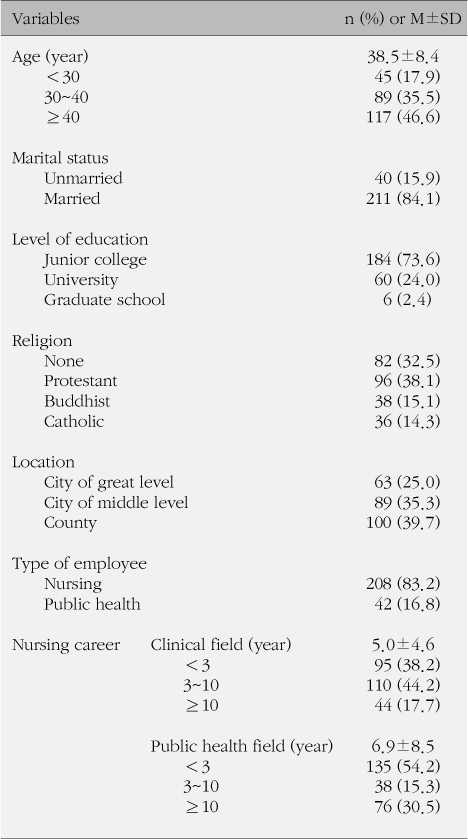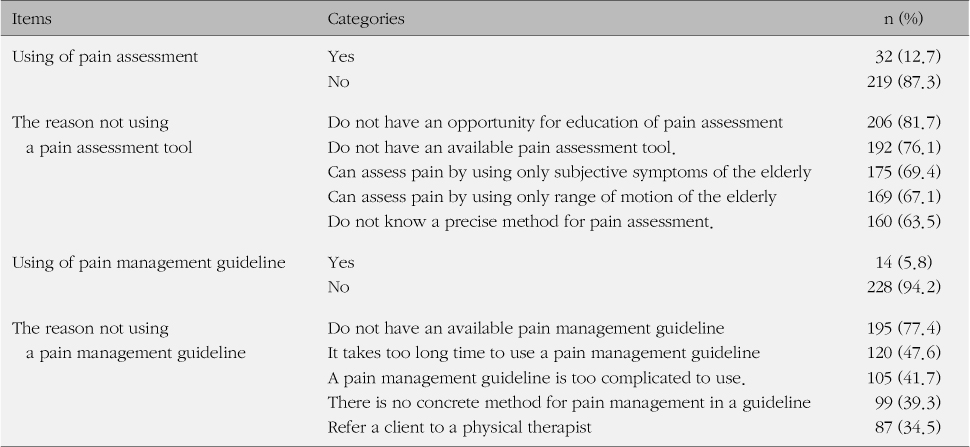References
1. American Geriatrics Society Panel on Exercise and Osteoarthritis. Exercise prescription for older adults with osteoarthritis pain: Consensus practice recommendations. J Am Geriatr Soc 2001;49(6):808–823.
2. Chang SO. Development and effect of pain management protocol for nursing home patients with dementia. J Korean Acad Fundam Nurs 2007;14(1):29–43.
3. Choi SO, Kim SN. The effect of cervical kyongrak massage on shoulder pain, shoulder exercise range and mood in the elderly. J Korean Acad Adult Nurs 2004;16(4):658–667.
4. Ebersole P, Hess P. Toward healthy aging human needs and nursing response 15th edth ed. St. Louis: Mosby; 1998.
5. Gagliese L, Melzack R. Chronic pain in elderly people. Pain 1997;70:3–14.
6. Gong SW, Bang JY, Seo MS, Hyun SS, Kim HJ, Lee MA, et al. Knowledge and attitudes of oncology nurses toward cancer pain managements. J Korean Acad Adult Nurs 2004;16(1):5–16.
7. Horgas AL, Dunn KS. Religions and non-religious coping in older adults experiencing chronic pain. Pain Manag Nurs 2004;5(1):19–28.
8. Hyun J, Park KS. Clinical nurses' knowledge and attitudes on pain management. J Korean Acad Adult Nurs 2000;12(3):369–383.
9. International Association for the Study of Pain. Subcommittee on taxonomy of pain term: A list with definitions and notes on usage. Pain 1979;6:249–252.
10. Kamel HK, Phlavan M, Melekgoudarzi B, Gogel P, Morely JE. Utilising pain assessment scales increses the frequency of diagnosing pain among elderly nursing home residents. J Pain Symptom Manage 2001;21(6):450–455.
11. Kwekkeboom KL, Bumpus M, Wanta B, Serlin RC. Oncology nurses' use of nondrug pain interventions in practice. J Pain Symptom Manage 2008;35(1):83–94.
12. Kim EJ. Reliability of validity of the short-form McGill pain questionnaire (SF-MPQ) Korean version for measuring the old adult's pain. Clin Nurs Res 2004;10(1):20–27.
13. Kim SJ, Ryoo EN, Park KS. A Study on pain, physical function, cognitive function, depression and agitation in elderly women with dementia. J Korean Acad Adult Nurs 2007;19(3):401–412.
14. Lee JK. Evaluation of pain assessment education program for nurses. J Korean Acad Adult Nurs 2007;19(1):66–77.
15. Management Center for Health Promotion. Guideline of customized home visiting health service (Summaary) - Focusing on the change Seoul: Management Center for Health Promotion; 2010.
16. Ministry for Health, Welfare, and Family Affairs. Case management focusing on the joint pain Seoul: Ministry for Health, Welfare and Family Affairs; 2008.
17. Ministry of Health and Welfare. Manual for intensive health management of customized home visiting health service - Joint pain Seoul: Ministry of Health and Welfare; 2010a.
18. Ministry of Health and Welfare. Teaching materials for public service personnel of customized home visiting health service Seoul: Ministry of Health and Welfare; 2010b.
20. Park JE, Kim MA, Oh DH. The effect of aroma-therapy combined with heat application on the pain, range of motion of lower limb joint, and discomfort of activities of daily living among patients with rheumatoid arthritis. J Korean Acad Adult Nurs 2008;20(6):839–851.
21. Park JS, Kwon SJ, Kwon YS. The effects of Dogbi (ST35) & Sulan moxibustion on knee joint pain, range of motion and discomfort during ADL in the aged. J Korean Acad Nurs 2006;36(1):189–196.
22. Park KS, Ryoo EN, Choi MH. The effect of balance taping therapy on pain of the lower back pain patient. J Korean Acad Adult Nurs 2005;17(1):77–87.
23. Park MH, Baek SH, Kim NC, Song HH. Cancer pain express pattern of terminal cancer patient admitted to the hospice unit. Clin Nurs Res 2002;8(1):147–161.
24. Park MH, Ha JC, Shin IH, Kim HG, Lee SY, Cho JH, et al. 2008 Living profiles and welfare services needs of older persons in Korea Seoul: Korea Institute for Health and Social Affairs Publishing; 2009.
25. Podichetty VK, Mazanec DJ, Biscup RS. Chronic non-malignant musculoskeletal pain in older adults. Postgrad Med J 2008;79(937):627–633.
26. Ryoo EN, Park KS. Study on suffering influence by nurses' pain experience. J Korean Acad Adult Nurs 2002;14(2):174–183.
27. Shin HS, Kim DH. Nurses' knowledge and attitude to pain management in children. Korean J Child Health Nurs 2003;9(2):140–148.
28. Suk MH, Yoon YM, Oh WO, Park ES. A status of assessment and management about children in pain. Korean J Child Health Nurs 1999;5(3):262–280.
29. Yang SO, Ahn SY, Yim ES, Kwon MS. The effects of customized home visiting health service in Gangwon-do. J Korean Acad Community Health Nurs 2008;19(1):88–100.




